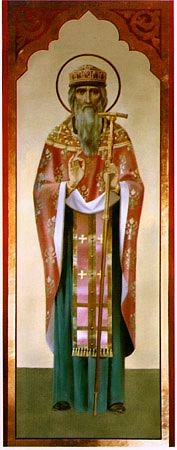
The Monk Dionysii of Radonezh
Commemorated on May 12
The Monk Dionysii
of Radonezh, – in the world David Zobninovsky, was born about 1570 in the
city of Rzhev. A novice, and then head of the Staritsk Uspenie monastery, –
during the time of the Time of Troubles he was the foremost helper of Sainted
Ermogen, Patriarch of Moscow. From 1611 the Monk Dionysii was archimandrite of
the Trinity-Sergiev Lavra. Under him, in the monastery environs was opened an
house and hospice for the suffering, the injured and those left homeless during
the time of the Polish-Lithuanian incursion. During time of famine under his
direction the brethren of the Lavra ate oat bread and water, in order to save
the wheat and the rye bread for the sick. In 1611-1612, together with the
steward of the Trinity-Sergiev monastery – the monk Avraam Palitsyn (+ 1625),
he wrote circulative missives with an appeal to send fighting men and monetary
means for the liberation of Moscow from the Poles, and also to prince Dimitrii
Pozharsky and to all the military people with an appeal to hasten the campaign
upon Moscow.
Monastery schooling
helped the Monk Dionysii during the very difficult circumstances of the bad
years to preserve unextinguished his inner light of the commands of Christ. An
high degree of monastic attainment, reached by the monk through unceasing prayer,
imparted to him a gift of wonderworking. But he carefully kept secret his
spiritual life from people, to whom this knowledge might serve only to
detriment. "Ask not the monk about the doings of the monk, – said the
Monk Dionysii, – since for us, monks, it is a great misfortune – to reveal
secrets to laymen. It is written about this, that let it be done in secret, so
that thy left hand not steal it away... it behooves us to be secretive, so that
our deeds be unknown, since by this the devil cannot lead us to all manner of
negligence and indolence". About the deep inner ponderings and
comprehensions by him of secrets of the knowledge of God it is possible to
judge only by those things which became apparent, when circumstances compelled
the Monk Dionysii to openly active deeds.

One such known event
was his propensity for correction of the Divine-service books. In 1616 the Monk
Dionysii spoke of work on correction of the printed Trebnik (Needs-Book) – on
the basis of comparison of the ancient Slavonic manuscripts and various Greek
editions. During the time of work, investigators discovered discrepancies in
other books, edited in the period between patriarchs (1612-1619). But in
response to these shortcomings, people accused the Monk Dionysii of heresy at a
Council of 1618. Deprived of the right of priestly-service and excommunicated
from the Church, he was imprisoned in the Novospassky monastery, where they
wanted to kill him by starvation. The intervention in 1619 of the Jerusalem
Patriarch Philaret (1619-1633) halted his imprisonment, and he was cleared of
the charges. The Monk Dionysii was known for his strict oversight of the
monastery ustav (rule), for his personal participation with the brethren in
monastery tasks and in the rebuilding of the monastery after the siege of the
Lavra. The Life of and Canon to the monk was composed by the Trinity-Sergiev
monastery steward Simon Azaryn and added to by the priest Ioann Nasedka, a
co-worker of the Monk Dionysii during the time of correcting the Divine-service
books. The Monk Dionysii reposed on 12 May 1633 and was buried in the
Trinity-Sergiev Lavra.
© 1996-2001 by translator Fr. S. Janos.